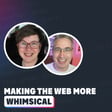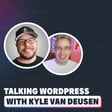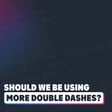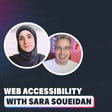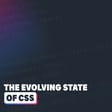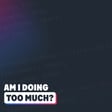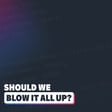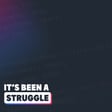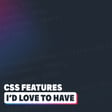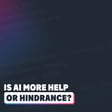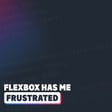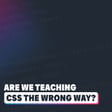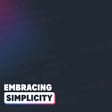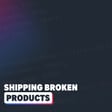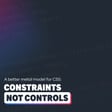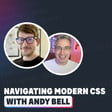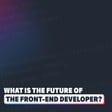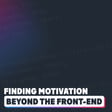Become a Creator today!Start creating today - Share your story with the world!
Start for free
00:00:00
00:00:01

Adam Argyle on getting a job in tech in 2025
In this episode, I sit down with Adam Argyle to discuss the ups and downs of navigating the modern job market. From the challenges of getting noticed to the creative ways Adam has showcased his skills, we delve into the realities of job hunting today.
Follow Adam:
Transcript
Podcast Introduction
00:00:00
Speaker
Hello, my front-end friends, and welcome to my podcast, General Musings. My name is Kevin, and in this podcast, I talk about whatever is front-end for me in any given week, usually in some way that's related to front-end development.
Meet Adam Argyle
00:00:09
Speaker
And today, I'm really excited to have a guest join me.
00:00:12
Speaker
He's someone who not only gets more excited about new CSS features than I do, but also dreams up some that he feels are missing from the spec and helps make them happen. And once he has them, he pushes the creative bounds of what they can do to the point where sometimes he manages to get his personal site to crash the browser.
00:00:27
Speaker
Let's welcome none none other than Adam Argyle.
CSS Adventures and Challenges
00:00:30
Speaker
Hello. Thank you so much. Oh, crashing the browser. That was fun last week.
00:00:36
Speaker
Yeah, I clicked through on that, the the link to to check it out. And I just got the the little dinosaur story or was it whatever the crash thing is in Chrome. And I was like, oh, I wonder what he did now. Yeah, yeah I left that up for a day because I got called out and it was like a punk would would break browsers. And was like, you're right.
00:00:53
Speaker
Punks do break stuff. I should break a crash. should just leave it broken. And then I was like... But wait, people want to read it and all I have to do is uncomment like one line of CSS. I should just do that. um Yes, my site has busted Chrome many times over the past couple years because it's using all the new stuff and they don't have tests that put
The Job Hunt Journey
00:01:10
Speaker
it all together. So my site is a cesspool or a beautiful garden, whichever one you want to consider it.
00:01:19
Speaker
uh yeah the joy i guess of of cutting edge css and i guess normally you and me could just like nerd out about all that maybe that and i feel like talking about that now so we'll have to have another recording where we get to endlessly talk about css but today's a little bit different because you recently landed a new job congratulations uh over at spotify uh it sounds like it was quite an experience to get to that job though and um yeah based on a little quick conversation we had and i said this could be interesting and i think a lot very useful for for people that are currently looking for jobs or that may eventually have to be looking for one so i thought it'd be an interesting conversation to have with you
00:01:58
Speaker
i I think there's interesting stuff to share. Things have changed a lot. I hadn't, i'd I'd only been interviewing others for the past seven years at Google, so I hadn't been the interviewee. And before that, I did lots of hiring at many different small startups, ah ah agencies, consultancies. I've done a lot of hiring.
00:02:17
Speaker
um And so it'd been seven, years. I thought things would be different. I thought AI would be um and more part of the conversation or whatever. And then I also um had a lot of referrals to use. I've been a very public, visible ah developer. So people are able to say, we know he can do this thing pretty quickly. So um I thought that would mean it was easier and it was not.
00:02:43
Speaker
Yeah.
00:02:46
Speaker
So I guess the first question is, why was it so hard? It's a big question, maybe, but I'm just curious. like do you have any general impressions or anything on what made it difficult along the way?
00:02:56
Speaker
Yeah, getting noticed is really hard. um There's a sea of people applying. um I don't think... people read resumes. So that let's start with resumes. And i I remember this even when I was hiring and I try to be a good um researcher. Like if you're applying, I want to genuinely, go I'm going to show up to that interview and going to have done research, which i apparently puts me ah weirdly ahead of like everyone else because no one else even reads resumes. So, and I was even guilty of sometimes skimming a resume.
00:03:29
Speaker
um You know, like, i don't really care where you went to school. I care more about like, what work skills did you acquire through your career journey, and stuff like that. And so i I noticed that my resume ah did nothing.
00:03:42
Speaker
So at first, I thought it was a problem with my resume. Because it's hard. It's just like a review time of the year. You know, like, Kevin, do you have to do this. you have
Innovative Resume Techniques
00:03:52
Speaker
to get reviewed by your peers, right? No, you don't. This is a lucky you. You don't have to go up for promotions or anything. But like when you do, it sucks, like summarizing yourself in a sentence, you know, because that's also sometimes the only...
00:04:06
Speaker
that's the That's the first amount of time anyone's going to give you is maybe a sentence. So like you have to really start there. Like people aren't going to read your resume. They might not even read a sentence. And that's kind of ridiculous.
00:04:17
Speaker
um So first off, I tried to boil my entire career into a page, which is super hard. I've done a lot of different stuff. And so I felt like I was cutting corners. And anyway, I've made my resume, felt really good about it. I did like four or five versions because again, this is sometimes people's first introduction to you.
00:04:35
Speaker
Like if I'm applying somewhere and they don't know who I am, even with a referral, someone's going be let's look at the resume. Turns out, I don't think people did. I don't think people looked at my resume at all.
00:04:46
Speaker
So what I did to kind of level up there is I was like, all right, there's competition. There's competition. I'm going compete, man, because I got kids and I want a job. And I was getting a lot of rejections. Okay, just real clear out there, everybody. I got a lot of rejections.
00:05:02
Speaker
Um, which was, I don't know, felt normal. Like people don't, I'm not, CSS isn't huge outside of this. And plus actually CSS being my focus for the past six years was a detriment because people thought that's all I could do.
00:05:14
Speaker
So like I had apply somewhere and be like, oh, he just does this. And I'm like, that's not all I do. Dang it. That's why I got the resume. And they're like, i didn't read it. I'm like, I can tell. um Right. So I made an animated resume.
00:05:26
Speaker
ah You can go to nerdy.dev slash resume and it's got scroll animations. It even had WebGL effects on it for a while because I was like, I want people to land here and be like, ooh, design engineer. Ooh, resume with animations and and particle effects and and grit and grain. And, you know, like I think I took off the grit and grain eventually because I was like, no one's even reading this anyway. So that was the next thing is I built this animated resume.
00:05:49
Speaker
I'd never seen anyone do it. um And it didn't matter. And I was like, crap, people still aren't... They would scroll... Literally, I know what they did. They would hit the link. They'd scroll it a little bit and be like, ooh, it animates. And then they leave.
00:06:03
Speaker
You know? And I'm like, okay. I give them that one impression ah that I can animate. Anyway, I'll stop there. So resumes, I'm... I think you should have one. I think it's a good practice for yourself to make one.
00:06:15
Speaker
It's good historical ah capturing of you. And maybe someone will read it. But holy cow, um if you're applying these days, i think you need to do better than just even a basic resume. So that's kind of the first topic. Yeah, do you have any questions or comments along that? um I guess, i so do you think like is are people just getting weeded out on their resumes because it just goes through like ai or whatever there's i mean before we talked about ai i know there was like they had the machine whatever software they would sort of go through i guess just to pick out keywords almost uh do you think that's actually part of it or is it even just there's a pile there and i don't know they i mean they must at one point have people pass the first step do you think the resume doesn't really factor in at all or is there still some purpose to having one
00:07:02
Speaker
Well, I'd say the main purpose is when like at Google, when I was submitting people for a referral, I couldn't submit them without a resume. Right. So it had to be in the attached upload for submission of this person. So you need it as table stakes.
00:07:17
Speaker
And i I do agree that there is AI that's got a checklist and it scrubs you vaguely and then sees if you check the checkboxes and you could easily be cut out that way.
00:07:28
Speaker
um And then the other thing, too, is people are using AI to generate resumes that are full of fluff and lies and stuff. So I think there's another reason that, like, the resume is just not the North Star that we thought it used to be.
00:07:40
Speaker
Right. Yeah. So yeah, I do think I got weeded out, but I i can't verify any of those scenarios that like, hey, an AI cut me out, but um we'll get into later. But just, it's so funny that you said, do you think the AI did that and had checkboxes essentially?
00:07:54
Speaker
Because that's what a lot of the interviews ended up feeling like. If someone showed up and it wasn't um but wasn't a capability an interview, it was more like, did they check these boxes for the things we look for? And it they were trying to treat everyone the same, but at the same time,
00:08:09
Speaker
Anyway, we'll get there. So yeah, did the concept of like checklists for evaluating someone um is part of the big detriment of what's happening right now.
Interview Process Critique
00:08:20
Speaker
um So cool. That was a great question.
00:08:23
Speaker
So um what I do now that my animated resume still isn't getting me attention and I'm still getting rejected from jobs that I could totally kick ass at. um I was like, what do people do now when they want to understand something quickly?
00:08:39
Speaker
they They watch a video. And so I was like, all right, I'm going to go make a sizzle video. ah I called it sizzle rizzle. So you can go to nerdy.dev slash sizzle, sizzle dash rizzle.
00:08:53
Speaker
Anyway, there's a video there that's a three minute song. It's to music. I spent a good amount of time capturing all of the stuff that I wanted someone to hire me for. And this is the main tip I want to send everyone, right? This worked phenomenally well because it took people five seconds, maybe 15 seconds to be like, okay, that's a lot of really cool animation.
00:09:17
Speaker
ah we we do We don't have anyone on our team like that. Bring that person in. That was it. It's literally they would find, they decide, and you could send this to higher ups. They didn't have to download your resume and open it up. They didn't have to go to anything but like hit this yeah URL. So I put that on my site and then I syndicated it to Blue Sky, Mastodon, LinkedIn, and Twitter.
00:09:40
Speaker
to get engagement on it. And then started pounding it on LinkedIn. So that way, additionally, not only was the video hopefully standalone, but you could see like comments and interactions with it that validated um the kind of content in there.
00:09:55
Speaker
And did that video... ah alone got me in front of very high up people um because it was so easy to share. And they all said, that's what we want. So that's that's like my one of my biggest tips in this that I want everyone to, if you're in front end or back end, I mean, literally, it doesn't matter.
00:10:14
Speaker
You need to showcase ah what you do in a short time. um And you need to showcase what you want to do, because this is what people are going to point at um So go out there and create that thing, um even if it's aspirational.
00:10:29
Speaker
It's almost like ah when you graduate school, you need to have like a portfolio. The portfolio might not be real clients, but it's still work that you've done that's in the vein of what you want to do. um So anyway, that's I stumbled upon that as a solution and it ended up being awesome.
00:10:46
Speaker
Yeah, that's really cool. i was just watching it now and I could see how they super shareable and definitely could catch people's eyes. that's really good and also just like comparing it to the resume where it was like when i loaded the resume up yeah it was there but it's just it is a wall of text so like it has the little animation come in and then just all that text that someone has to actually go through is here you're just like cool thing cool thing cool thing so like they're gonna sit there and be like oh that's better than like you know created like an animated carousel is like here's this like you know it's
00:11:17
Speaker
You're showing It's very low attention span that video. Yes. I sped up a lot of the interactions because I wanted to hit you with something like every few seconds, just like a TikTok. I was like, what are, what are people addicted to? How do they get fast impressions? I'm like, I got to just whiz this stuff in front of them. and So, on yeah.
00:11:34
Speaker
Yeah, that's, that's really cool. And I'll make sure that it'd be linked under the video. So if anybody wants to check it out, it's right there. So it's just, and if you're listening, sizzle hyphen rizzle, nerdy.dev forward slash sizzle rizzle.
00:11:47
Speaker
I think the cool thing with that, actually, you're you're mentioning is just how it got you in front of, you know, you you almost skipped a step because other the higher ups were we're seeing it.
00:11:58
Speaker
And they might not be hired this guy, but it might be we need something like that. So let's at least get them into the process of of getting hired. Yep, exactly. um And then I still got rejected after scenarios that that happened. So that's the that's the next thing. to like it's It was still so difficult to get another role that um even having this, which put me ahead of other people, ah wasn't some fast track. It was a fast track for visibility. was This is what it did do. It got me noticed in the pile.
00:12:30
Speaker
and And it really set the stage for I wanted a design engineer role. So I needed to make it easy for someone to point at me and say, he's a design engineer and and just showcase that work. ah So then it comes into like rejections. um Yeah, it was really depressing some days because I would... um Once I was done with like the summer break and the the leave that I got after being um let go from Google. Well, yeah, anyway, it's part of the layoffs.
00:12:56
Speaker
I really hit the ground running. And so I applied to like 20 places one day or whatever. And then to just like over the next few days, like I'd feel really good about applying. Oh, that felt so good. Look at all those seeds I planted.
00:13:06
Speaker
You know, how many people are gonna watch that video And then like the next few days are just like rejection, rejection, rejection, rejection. And was like, this is pretty brutal on the... Ego, I got to say, are we what am I going to do?
00:13:20
Speaker
um But then, you know, a couple of those turned into plants. And so that's kind of the other thing I like. I like to think of um my dad growing up would say, you don't get what you don't ask for. And so um I call it these days planting seeds. You won't grow a plant if you don't put the seed in the ground.
00:13:37
Speaker
and so And throwing a seed on the ground is is really easy. yeah i'm Cultivating it into a grown plant is where it's hard. But anyway, you need to know what's a starter and what's not. So I threw out a lot of seeds. I got a lot of rejections and tried to focus on the plants were growing.
00:13:49
Speaker
um So i I got noticed. And now I started getting into the interviews. And this is where ah stuff was initially really good. So these i had interviews at... um Places like Discord and OpenAI start to pop in.
00:14:03
Speaker
um i got rejected from Nintendo. I was really bummed about that one. I was like, I could have ran that Nintendo website. Imagine like me in the Nintendo website. All of a sudden, it's just like awesome. um But they didn't know. They didn't even they didn't consider.
00:14:17
Speaker
um And then I had referrals where um it was a person at the – so like Adobe, I got a referral to an Adobe role, multiple Adobe roles that I could have worked on. So I submit, and then I get rejected.
00:14:28
Speaker
And I'm like, okay, well, I don't know what happened. but And then later I'd talk to someone and they'd be like, yeah, it was basically an accident. Like the person didn't know and you got phased out through whatever filtering system. We don't know what, but we're all mad about it.
00:14:43
Speaker
And I'm like, okay, well, that's cute. You're mad, but I got rejected and I moved on. So it's over. you know, like that sucks. um I don't know how to fix that scenario. Yeah. um But it ki comes down to that checklist. Somebody put me against a checklist and I just didn't check the boxes. It's probably that my resume or my submissions did not say I was React heavy or something. which is a very So we'll get into some of like the React scenario um here soon.
00:15:12
Speaker
So, okay, yeah, I'll take a pause. going to breathe. do any Any questions or comments anymore? Okay. I guess the interesting thing there is like the referral, I guess, just gets you that it you know gets your name on the list somewhere.
00:15:27
Speaker
But as you said, then it's just that you're it doesn't act necessarily actually mean a whole lot, which is interesting. Like you'd think that would automatically at least not. I'm not saying get you a job because I don't think that's how it should work, but at least sort of.
00:15:41
Speaker
get you past a certain step there if people that are already working there are like this guy would be a good fit because they know the work and they know you and what you're able to do it you know and so you'd think that would be a pretty high like ah that should count for more than a lot of other things i guess and it's just interesting that it doesn't seem to really change much it I agree with you. In the past, a referral was um not shoe-in, but it was very impactful and had a lot of sway and influence on your application. And I found those two not happen this much and this time.
00:16:19
Speaker
Okay, so let's say I get in the door um and I go through the first few interviews. And the first few interviews are usually not technical. And sometimes they're with a recruiter. and And I remember a specific conversation with the recruiter. They were like, um we've been interviewing for this role a lot of times and you are just checking all the boxes. They wanted someone to bring in UI polish,
AI in Interviews
00:16:41
Speaker
um internationalization, accessibility, and um and, yeah, just animation polish and just, like, making it better for users. And I was like, you are talking to a really good person for this particular task.
00:16:55
Speaker
And so I go through the interviews. I do a architectural diagram interview, you know, and they're like, oh, you did really good on outlining backends. And I'm like, I don't even know why you asked me about how well I can, but, okay, whatever. I'll show up to this and do it.
00:17:08
Speaker
And then I do these other interviews that none of them are about design. None of them are about accessibility. None of them are about aid. None of them have tapped on anything that they want to hire me for yet. So that's also pretty normal and annoying, you know.
00:17:21
Speaker
But then we get to the technical interview. And this is where things got really sour for me, where I was like, how have we not grown up as an industry? Because I went into these technical interviews, and and I'm going to use a metaphor at first, because this is what what it felt like.
00:17:34
Speaker
Hey, we we need a guitarist in our band. Anyone play guitar? And I'm like, hey, yeah, I've been playing guitar for like 20 years. I played guitar for these bands and these bands. You guys need a guitar? Yeah. Yeah. Hey, bring him in for interviews. Bring him in for interviews. All right. So I shoved to the interviewer like, all right, here's a bass.
00:17:49
Speaker
Show us some bass lines. Show us your technical bass line skills. And I'm like... Why? I'm not going to play bass here. I'm going to play guitar. And they're like, it's just the interview.
00:17:59
Speaker
Our interview, we have everyone play bass. And I'm like, okay, well, you're lucky I can play a little bit of bass, just like the back end architectural diagrams. Hey, I'll play ball. I've been in this industry a while.
00:18:10
Speaker
Play some bass lines. Get to go. Hey, we ah you didn't make it. I'm like, well, no kidding. You tested me on base. So anyway, so what
Positive Interview Experiences
00:18:20
Speaker
this means in terms of ah not a metaphor is I got brought in and they want animation, front end, UI, modern, all the stuff that like I'm known for. And then I get into the interview and and it's a technical React interview building some pretty basic component.
00:18:37
Speaker
Now, I know React enough. I finished all of these technical interviews. However, I could tell that I was not checking boxes that they needed throughout the interview. And I had a checklist that they weren't checking for me personally. So I would be working on the um interface and I'm like, ooh, I'm going to add this little accessibility thing right here. So that way it does this. And they'd be like, don't do that.
00:19:02
Speaker
And I'd be like, really? And we're like they were like, we need you to complete the component just in the given time. um So that's your goal today is just to complete the task. I'm like, okay, it's only going to be like a minute. I can make this thing like report properly to a screen reader.
00:19:17
Speaker
No, nope. Oh, and so on my little checklist, I'm like, That's weird. And I hate that. So I'm just going to go ahead. out And then like later I'd be like, how about I, ah how about I animate this thing?
00:19:28
Speaker
It's, you know, great. React rendered it. Whoop-dee-doo. That's what it does. um Let's make it cool. And they're like, nope, don't need you to animate it either. And I'm like, what? Okay.
00:19:39
Speaker
So now you can see where the bass and guitar thing is happening here, where it's like, yeah my value is not my React skills. And so it turned out a lot of these interviews were basically testing new grads for their memorization of hooks.
00:19:53
Speaker
And I don't have all the hooks memorized. I know Claude and G-I-G-P-T have all the hooks memorized. I don't give a rip about it. Plus, hooks aren't... my bag, I'm here to add the desirable part of this, not some optimized react. You have probably 50 of those already.
00:20:09
Speaker
You don't need more. I'm here because you need someone like me. Anyway, um and so it got so old. i had so many these scenarios happen and I'd always complete the task that I called him out one time and it was at OpenAI because I i really liked the person i was that brought brought me in. multiple I had three referrals to an OpenAI role And I get in there and, ah you know, I do well on everything until it comes to the technical interview.
00:20:36
Speaker
And the technical interview, I get the rejection. And I write the person back. And I'm like, hey, I know it's uncool to be like, you failed me, but your test is broken. But hey, man, i got to tell you, because this is happening a lot, like...
00:20:51
Speaker
Your test is broken. It did not ask me to do a single thing that you want me to do on your team. Me and you met face to face. You told me what your team needs. And then your technical interview didn't ask for any.
00:21:03
Speaker
There was no opportunity to spread my wings, show you my skills and show you the expertise that I would get. You basically were just hiring new grad React developers or testing them like they are one, which even if someone's advanced, like, what are you doing? You've been testing them that basic.
00:21:18
Speaker
It was really broken. And he goes, ah we've heard that before. And you're right. um Let's bring you back in. Let's get you back. So OpenAI was like, let's bring you back in.
00:21:29
Speaker
We see what we did wrong. um Next week, show up, interview, but it'll be different. So I show up to the interview it's the same interview, man. It's literally, it's a different person.
00:21:40
Speaker
Yeah.
00:21:43
Speaker
And like a different component. So instead of a toast to notification system, what did I build this time? um Who cares? Who cares? so It was something equally where I wanted add accessibility. They didn't care. Wanted to add, they didn't care.
00:21:55
Speaker
All the things that I was supposed to be brought into didn't get tested. And I didn't excel at what they were testing, testing which was irrelevant to the world. And it was just shenanigans. And the the funniest one ah to me was when the recruiter rejected me.
00:22:10
Speaker
And we were talking about it and she's like, yeah, we're having a really hard time filling this role. And I'm like, no kidding. yeah I can't imagine a single reason why you're not hiring anybody for this role. Maybe it's the mismatch of expectations and the technical test.
00:22:25
Speaker
Anyway, I'm gonna pause there, but it's so weird. Yeah, no, I like how you wrap that up, just because at the very beginning, I had this question that was sitting in my mind, you sort of came back to it there, just of like you'd said, how they'd been so something similar at the beginning, where you said they'd been hire or doing a lot of interviews anyway. And, you know, it's, that's sort of like, a okay, why is it so hard to find somebody? And it's, you go through that whole thing, you're like, because you're Yeah, it's just it's frustrating that no one realizes what the like that's in that side of things who isn't sort of stopping for a second and going like, why are we doing it this way when and that if you do find someone who passes the.
00:23:06
Speaker
the tests along the way, then they're probably not going to work out because their skill set doesn't align with what you you actually wanted. It's bizarre. It is bizarre. And so that's kind of like the beginning too. And I was like, um I had high
Staying Updated in CSS
00:23:20
Speaker
hopes. It'd been seven years since I was in the thing. And we're basically interviewing still like it's jQuery days or...
00:23:27
Speaker
um Or it's just intense JavaScript for like no reason. It's not the same as like Google interviews, which did traditionally have tricky computer science questions or or needless, you know, what did people call them? the elite Elite coding issues. Elite coding, yeah.
00:23:41
Speaker
Yeah, and I studied for elite coding when I interviewed and got elite code questions. Yeah. And so i expected some of it, but just to see that we're this far in, it's 2025 and we're still trying to hire devs like this, it's just ridiculous. Now, there are um companies not doing that.
00:23:59
Speaker
And so we can like talk about places that i interviewed that did have good processes and that were um optimized for bringing in talent and letting people show off. Like you should in the interview, you should be like asked to show off, like come show us your skills.
00:24:12
Speaker
um So anyway, we can get into those too. But then and for AI in the interview, um this is a fun topic before we got into who did it right. But OpenAI did not allow AI in the interview, which I thought was kind of weird.
00:24:25
Speaker
I was like, I'm pretty sure they're going to expect me to use ChatGPT every day as part of my coding process. And again, the mismatch of what we do every day versus what the test did. The test said no AI assistance. And I was like...
00:24:39
Speaker
For me, I generally don't care because I've been writing without AI for 20 years. But um it was interesting, too. So at Shopify, they did allow in the interview. In fact, it was like encouraged. And so the interview starts and they're like, here's your task. And I go, that task could be one-shotted right now.
00:24:54
Speaker
I'm pretty sure I could write a single prompt and the interview would be done in like two minutes. And he's like,
Closing and Contact Information
00:25:00
Speaker
yeah, someone did that yesterday. And I'm like, I can't tell if he's saying, yeah, like that was bad or yeah, that was good.
00:25:09
Speaker
So I was in in my head, I'm like, well, I'm going to demonstrate how I interact with AI, which is I like to pseudocode and then ah take my pseudocode and ah find where i I want to just write it and find where I want its assistance. Because I don't like one-shotting things. I do like making plans and I like guiding. so I like guiding an assistant. That's fine.
00:25:30
Speaker
And so I started building it. um Oh, and I have one other thing to tell you that was happening bad. You know, when I was talking about accessibility and animation, they didn't want it. There was a really negative comment that i'm and I'll tell you here in a bit. but So I'm going through the AI interview and I hadn't used it yet. We're like 30 minutes in. I hadn't used AI at all.
00:25:46
Speaker
And I finally got to this one part where I'm like, ooh, this is matrix math. Ooh, I need to... I need to figure out an N number of possibilities with inside of a multidimensional array. I was like, ooh, big brain time. And I was like, oh, or AI time. And i was like, hey, i bubbleh blah, blah, blah. And it knocked it out instantly because it's just a known solution. Like what what I was doing was not special. It was classic. So anyway, boom, nails that thing.
00:26:11
Speaker
I do the rest of it. And like I'm done early. I showed my skills. I added accessibility. I added animation. I used AI. It felt like, a to me, that was the interview i would like to see as an interview interviewer.
00:26:25
Speaker
And then AI did move through at Shopify. So I found that ah AI. And they were the only ones that allowed AI in the interview. So even though I'm sure all these companies like want you to 10x yourself, ah but you can't 10x yourself in the interview. You need to one-tenth yourself and play bass, I guess. Yeah.
00:26:39
Speaker
um Okay, and then let me recap the the negative thing that I remembered. I did one interview where it was optional, ah vanilla JavaScript or React? Dude, was a trick question.
00:26:51
Speaker
They wanted React, right? So of course, I picked vanilla though. I pick vanilla because I'm naive and I'm just like, oh, I'm going to show my skills. I know a bunch of browser APIs. And so um I do. And I do. One of the things I do is I use a field set and I put all my inputs inside of it, inside of a form.
00:27:06
Speaker
And then I get all the data off of it with the form data call. I'm like, all right, let me just get all the data out of this form. And they go, oh. I didn't know that and i don't know that existed. And i was like, oh yeah, it's just an API.
00:27:17
Speaker
So then the rest of it goes on. And I continue to use things like at starting style, um view transitions in one scenario and something else. And the conversation drastically turns to them going,
00:27:29
Speaker
I didn't know that existed, but it was this like looking down their nose, like that's a really lame API. Like, I can't believe you're spending your time learning this stuff. Like I've never seen it before.
00:27:42
Speaker
We're successful here. And but this is just weird. And so I got, was like, it turned into them saying, I've never heard that before, but it turned into a phrase of, you're a dork kind of thing.
00:27:55
Speaker
And I was like, wow, this is so really snobby interviews turning into like, uh, I'm just up here floundering and and you're judging the crap out of me. So I feel like some of this is like going to be really relatable for front end developers who have CSS expertise, maybe the front of the front or the back of the front, uh,
00:28:13
Speaker
Whether you write JavaScript or not, I think finding your way to spread your wings and show your skills in today's interviewing scenarios is very difficult. And employers need to change because I think that one of the harder things to do right now is have a beautiful UI.
00:28:27
Speaker
You can vomit ah a prototype out really quick, but polishing it is really tough. You need people who come in with the craft and the polish. And so I'm worried that not only is it... decommoditized or whatever. We've got tools that kind of claim to do the role, but our interview processes ah are also weeding us out. So um I worry for all y'all out there. And I hope that by hearing some of these things, you can find a way to get at the table.
00:28:52
Speaker
And maybe push back. I think we should be pushing back. I shouldn't have been so scared to tell some of those other interviewers that this was a dumb interview. That might have actually got me the job. You know, hey, that interview was broken. This is what you should have done. I'll write it for you. So all your subsequent ones are good.
00:29:05
Speaker
They're hire him. He's fixing our problems. You know, um so anyway, I'll pause there real quick, too. Other than it just being is a little bit depressing, I guess, in a way of. It's depressing. Yeah.
00:29:17
Speaker
the that dis The whole thing is it just sounds like... And again, like you said, it seems it's not a problem that's necessarily new, but maybe it's even getting worse of this disconnect between what people are looking for, the role that's to be filled, and how they're trying to find it. And it goes through all of the steps along the way.
00:29:38
Speaker
um is pretty i mean It's disheartening, but it also makes you wonder... like Just for these people that are in the hiring roles, like you said, like if they're looking down at you because you're using things they haven't seen before that do the job really well, that you don't need a dependency for it. Like that's a really strange take. i don't know. It's, um, yeah.
00:30:01
Speaker
Yeah, I guess in a sense, I guess ah you've hinted at it a few times now, but there were a few different interviews you were going through where it probably like you had the red flags going off along the way as well. So even if you had passed, you think, I guess it depends, you know, if you've been looking for.
00:30:19
Speaker
18 months and the find someone finally is like, yeah, we'll hire you. You're like, okay, I need to make some money. but then yeah But was there any where you were sort of like, ah ah well, it sounds like there were some that maybe you were secretly happy or at least not maybe not happy, but not disappointed when the rejection came in?
00:30:37
Speaker
Yep. And I didn't know it at the time. You know, i really wanted the role. And so then to get the rejection, was really sad. But then to reflect on the interview and just the whole scenario. Okay. And so this is where Shopify um excelled, like wildly excelled. And then there's another company I interviewed for, out Paper, which is a um Figma-like design tool built on the platform. So when it renders Flexbox, in quotes, it's not synthetic Flexbox that's being rendered in Figma's It's compiled WASM rendered tree or whatever. It's the actual browser doing So you what you see is what you get when you go to production. I thought that was really rad.
00:31:13
Speaker
And so Paper, what they did, since it's easier to explain, is they did an interview with the two pretty much founders. There's only like three or four of them in a team at the time. And the product was...
00:31:24
Speaker
really pretty, very robust, very foundationally sound and needed to scale up to more stuff. And I just, I felt really right for the job. So anyway, the first ah the first part of the interview is show us relevant things that you've built and just brag about them.
00:31:40
Speaker
You know, open up a yeah URL, open up local host or whatever you want to do, but show us something you built that's along the lines of like a graphical editor or something complex with a lot of state or something very interactive, something you feel applicable. And I was like, what a great way to start the conversation, right? Like who, what kind of dork would apply for a job if they didn't have things to show that are like along the lines of what they're applying for.
00:32:03
Speaker
So I pull up gradient.style at the time and a couple other tools. And my gradient editor was um far ahead of theirs. I had conveniences and interactions and a lot of things they didn't have. And so we spent a lot of time talking about that. We spent time talking about Chrome DevTools work that Anyway, so an hour in, they're like, we trust you.
00:32:25
Speaker
We like the work we saw. um We like your expertise. The next phase of the interview is you can we're um we'll bring you on as a temporary employee for two weeks, fully paid,
00:32:38
Speaker
If you land PRs we're happy with, you stay on and it's good to go. well
00:32:46
Speaker
And I was like, that's pretty cool. I'm pretty sure if I was there for two weeks, I'd give you more PRs than you wanted and it would all be really good. you know and So I liked that one. Have you heard of anyone doing something like that? Like a two-week fully paid trial run and then you're just on if you stay?
00:33:03
Speaker
Yeah, no, that's really cool. I always hear about the ones of like, we're giving you this thing as homework that you have to do that's essentially free work and give it back within a week. And I'm always like, oh, I hate that so much. Like, at least pay the people for their time. Like, that's such a ridiculous thing. So to hear that, like, that's really, really cool.
00:33:20
Speaker
That was cool. So Paper, shout out to your hiring. You're in the top three of all of the interviews that I did in terms of quality, listening to me giving me room to demonstrate my expertise. It was awesome.
00:33:31
Speaker
So then Shopify, where I was applying as a design engineer, design engineering is a hard thing to interview for. you know You're like, oh, we have design interviews and we have engineering interviews. Crap, where do they fit?
00:33:42
Speaker
um And they had a ah a few phases of it. One of the phases was like a story. You tell your story, how you got to where you are applying to Shopify. And all the things you value along the way and things that help build your character.
00:33:57
Speaker
So that alone was like this weird therapy moment where someone's just listening to you just like vent about your tech career history. And it was cool. i was like, why doesn't other people do this? This is like you learn a lot about who I am and what I value and what I can do in one little interview.
00:34:15
Speaker
what ah What a nice little scenario. Mm-hmm. And then there was a technical interview, which the technical interview was AI assisted. They weren't there to trick me. They were there to watch me work. You know, solve this kind of generic-y thing. We want to see how you would do it.
00:34:30
Speaker
And they didn't have a checklist. They were listening and watching and attentive to the things I was doing, which was really cool. um um And then they were even in the process of changing this system.
00:34:43
Speaker
And so they were really cautious with me, like saying, hey, we want to make sure you get an opportunity to demonstrate a skill that you you think you need to demonstrate to us to show us your value and stuff like that.
00:34:54
Speaker
And so it's just it was all very considerate. There was a lot of positivity and reinforcing. People wanted to see me succeed, which was like the opposite of like the leak code things. The leak code things were like, solve this, sucker. You know, you're like...
00:35:08
Speaker
Dang, that's really rude. You want to interview me that way? Okay. yeah And so um that was really nice. But apparently it's really hard to get through at Shopify also. um But um I must have done well but because they gave me an opportunity to share these things. So i was really happy about that. And so after I'd gone through all these crappy interviews – um And then there's Shopify, which is like exemplary.
00:35:32
Speaker
I was really happy. Plus all my friends that are there are are really happy. And then as I'm even, this is my second week. um This is going to be a great place for me. So I'm really excited about it. But it's just the the journey to get here was full of thorns and buttholes and, um you know, unexpected twists and turns. I played instruments I didn't need to play just because I was doing a song and dance for someone.
00:35:55
Speaker
um And yeah, it's kind of the whole story. Yeah. that's um Well, you know, it sucks that it was it was difficult and you went through a lot of trial and tribulation, but at least you there were some positive experiences along the way and you did end up at a place that you're really happy with. So ah very glad to hear that. Happy ending. Yay.
00:36:17
Speaker
um I'm going to add, or I don't know, is was there anything else along the way? i know you'd you'd sort of had some notes that you wanted to get through. Was there anything else that... Those hit the bullets. Yeah. Those hit the bullets. Awesome. um So I will ask then, having gone through all that and seeing like the really good, the really bad and everything, maybe there's some hiring people listening right now. They're they're involved in the process and they're like, Hmm, maybe we should change our process a little bit.
00:36:40
Speaker
They got some insight there when you talking about, um, what you, the positive ones you did go through, but let's say you're in in charge of hiring a new front end developer, uh, you know, focus a little bit on, I guess the type of things you're doing, but front end stuff.
00:36:55
Speaker
CSS, HTML, maybe a mix of ah the accessibility in there. Of course, that might need they might have to use React and everything else and be familiar with it. um But I'm just curious, ah do you have an idea of what, if you were doing it, what would the interview process actually look like?
00:37:12
Speaker
Yeah, what should this modern ah like scenario look like? i think the core thing is giving people space to flex because I think that's what they want to do when they show in interview.
00:37:26
Speaker
they're They're ready to demonstrate. And so you could it should be relevant to the to the role that they're doing. So find find something that's um common and um so that you're not giving a unique test to everybody. You need to have some sort of control.
00:37:42
Speaker
So it should be a consistent request. Find something small enough to finish within an hour and let it orient towards their skills. And so let them kind of drive their solution through it and observe whether or not it's going to match the requirements you have for the role. So if it's a back of the front, let's say it's design systems back at the front end. So this person basically doesn't even need to write React.
00:38:05
Speaker
You should give them a task that allows them to create a whole stack of custom properties that can pivot off of all these different scenarios that have good naming conventions and they can demonstrate and explain why they're there type of deal.
00:38:18
Speaker
And then same thing goes to someone's a front-end developer. I would test them on HTML first. But like, let's just walk through a few different components and just conceptually talk about the semantics that you could choose, ways to represent this information. How familiar are you with what a screen reader is going to see when it's breezing over this element or focusing this element?
00:38:37
Speaker
and Let's talk about focus states. Let's talk about modalities, you know, like someone who's going to be handling all these things, you should... ah Ask them about it. Maybe, oh, you could have somebody work through an issue that's in the backlog or at least have a couple of example issues that have been solved in the past and have them be confronted with a bug.
00:38:54
Speaker
You know, like, hey, imagine it's your first day. Here's a ticket. What do you do? You know, you can go make a Git branch or I don't just walk me through the process that you do. Maybe we don't have to code it. Let's just have a conversation about this bug. So that's even something you would do pretty much day to day with someone is you'd get an issue, open it up in your tab, maybe ah have a call with a coworker and chat out the issues before you go hammer on it.
00:39:17
Speaker
Mm hmm. So yeah, trying to simulate the reality of day to day in so much that you're getting people to spread their wings, showcase their skills, and ultimately flex and brag. Honestly, I think there should be a point in there somewhere about bragging.
00:39:34
Speaker
And it doesn't have to be long because I know bragging is really, that's one of the hardest parts about making resumes. It's hard to brag and talk about yourself. Oh, just had ah ah something that was stuck with tack just fell off the wall.
00:39:46
Speaker
It's okay. Tack sucks, everyone. i used to tack and it was whack. so um But yeah, I think some things that allow that would definitely help. um Gearing things towards the person and the role.
00:39:59
Speaker
But maybe that's too hard for big companies. I don't know.
00:40:03
Speaker
Yeah, I guess I think just being aware of what you're actually hiring for is so important. And it amazes me that that's not always the case. And it seems like there's so much resource that goes into hiring somebody that it's expensive for the company to Then you're finally getting somebody, you have to onboard them. through such an expensive process of getting a new employee in that you think you'd be trying to optimize how you're doing that for all the different roles. And Anyway, I just keep saying the same thing over again now every time we have a comment of just like, why are we still doing it like this? Why are we doing Well, and yeah, you're reminding me too that we had a similar issue 10, 20 years ago, which was um you would put out the job posting on the website.
00:40:47
Speaker
And the job posting didn't have the requirements or had a whole bunch of extra crap in it that like you didn't actually want in the role. And so there was this tension between like we have headcount and then you just posted the description that's like five years old. Why did you use the old one? And the recruiter's like, I don't have an up-to-date database description that you wanted. You didn't give it to It's like, well, who's going to write the one that who we want to hire? And it's like you had this like back and forth. And so you'd show up to interviews and the job description could have been wildly irrelevant like what the actual job was they wanted. It's just bizarre.
00:41:18
Speaker
Yeah. ah Hopefully things do start improving. and And again, hopefully a few people who are interviewing have listened to this and maybe are going to be changing their ways. I want to thank you for your time for all of this. Normally when I wrap up these, I ask five rapid fire questions about CSS, but I've already have done that with you as a guest in the past.
00:41:34
Speaker
ah So I'll let people go listen to that episode if if they want your answers to my usual questions. um But I'm going to ask one CSS related question of now that you're working at a, I'll call it a regular job.
00:41:46
Speaker
how How are you going to keep up with CSS these days? Yes. um i I made myself a list the other day. i posted it. What was the thing called? it was like 100 plus CSS features from the past five years.
00:42:00
Speaker
And that was me going, I don't know what all these are, but I need somewhere when I have downtime to go find them. And so i'm like, boom, I'm just going to make this huge list. um And then how to stay on top of it. I'm going to scroll that list, find a thing. I don't know what it is.
00:42:13
Speaker
I'm like, oh, the colon heading function. um So I can find all the headings or what can I do in the functionals thing and go figure out what happens in the functional notation. um So I'll be doing that. I do follow the intent to ships.
00:42:26
Speaker
um These are Twitter accounts that you can follow. And then the other thing that this is something very Adam centric to do. So I don't necessarily suggest everybody does this, but I made a new chromium.org account in the bugginizers like for the bug tracking.
00:42:41
Speaker
yeah and went and found all sorts of CSS features that I want and starred them so that I'll get notifications whenever work starts to happen on them. So I think the intent to ship things are really good. You can also go to baseline. they have They produce an RSS feed. They also have lists. So if you want to see what's baseline and not what's just kind of coming out in CSS, you can go there.
00:43:01
Speaker
Those would be my suggestions. so Awesome. Yeah, i should I wish I remembered about your site that you did because I had seen it. I was at um it was out the other day and I was talking with someone was heavily involved in web, but not front end at all, like more of a back end guy. And he was out of it for a while too. And you know they'd always people like that have always dabbled a little in CSS, but I think they hadn't touched it at least in 10 years or something.
00:43:26
Speaker
and then he's like so what's new in css and i was just like oh my god where do i begin it was just like and then i start talking about it like a few little things but i'm like i don't remember everything but then as you talk about one thing you remember but another into another and they were just like i'm like i have to stop now but this list keeps going so it would have been nice just to here check out adam's blog post it's all there yeah Yeah, I made it to answer that question too. And then I just gave a talk at CascadiaJS. It's literally called like, help, I haven't been paying attention to CSS and I don't even know what's going on. you know And so it's a 25 features in 25 minutes. Like here's here's a TikTok-y style thing that helps you get caught up.
00:44:06
Speaker
But yeah, there's a lot. Yeah. Anyway, want to say thank you so much for joining me. It was a blast chatting as usual. ah For these days, where can people follow you?
00:44:19
Speaker
Yeah, nerdy.dev. I have an RSS feed. Find me on Blue Sky. Find me on Mastodon. Find me on GitHub. um Yeah, those are good sources right there. Awesome.
00:44:29
Speaker
And yeah, every link and every other thing that we've mentioned along the way will be in the show notes. And i just want to thank everybody for listening. And until next time, don't forget to... Oh, I screwed it up. Make this corner of the internet. I'm not going to steal your phrase. no You can do it if you want. ah um Make your corner of the internet just a little bit radder. Wait, little bit more awesome.
00:44:50
Speaker
There you go. Yeah, okay. Good enough. sir that


